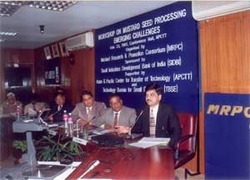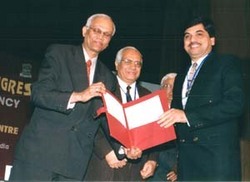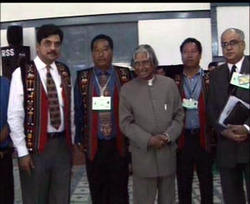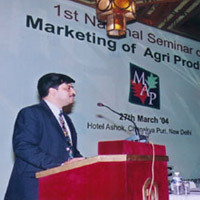Presentation
|
1.
|
Optimal Expression of Oils – key to oilseeed sector future | |||||||||||||||||||||||||||||||||||||||||||||||||||||||||||||||||||||||||||||
|
2.
|
Modernisation and Technological Up gradation for reduced Processing Cost | |||||||||||||||||||||||||||||||||||||||||||||||||||||||||||||||||||||||||||||
|
3.
|
Molecular Distillation for Edible Rice Bran Oil – The Complete Solution | |||||||||||||||||||||||||||||||||||||||||||||||||||||||||||||||||||||||||||||
|
4.
|
Total Quality Management – to maximize food value of mustard oil | |||||||||||||||||||||||||||||||||||||||||||||||||||||||||||||||||||||||||||||
|
Optimal Expression of Oils – key to oilseed sector future Indian Oilseed sector has not been able to live up to the promise shown a decade ago. The oilseed production levels have largely remained stagnant and the oil import bill has been mounting every year. Liberalisation of economy has exposed the shortcomings of Indian farm sector as well as oilseed and oil processing sector, which has not kept pace with the technological advances. Inconsistent government policies and delayed actions have further added to the woes of the sector. Mechanical Crushing (popularly known as oil milling) of Oilseeds is a basic step in oilseed processing for Mustard seed, Groundnut, Sunflower, Safflower, Cottonseed, Sesame seed, Castorseed etc. The processing dominated by small, unorganised and primitive oil mills, is labour intensive and inefficient, which has a cascading effect in forward as well as backward direction. Industry segment comprises of Kolhus (for mustard and sesame Oil milling of mustard seeds in India deploys multistage crushing which requires larger space and operative labour, inhibits mechanisation and consumes higher energy and results in poor quality of oil and cakes. The screw presses being used are susceptible to high wear & tear, downtime and maintenance costs because of older designs and poor metallurgy. Optimal expression of oilseeds requires adequate preparation and minimum Replacement of conventional milling equipment with high technology, energy efficient systems can bring about substantial benefits which outweigh the higher initial capital cost (additional investment recoverable within a year) and can make the sector internationally EXCERPTS OF THE PRESENTATION Oilseed Sector – an overview Near stagnant oilseed production since 90’s Mechanical Crushing of Oilseeds Basic step in oilseed processing for Mustard seed, Groundnut, Sunflower, Present Status of Mustard Seed Crushing Industry segment comprises of Kolhus, mechanical screw presses and expanders Unit sizes – 10 TPD to 400 TPD with 10 to 100 TPD forming the bulk Problems with Existing System Multi stage crushing Expression of Mustard Oil – the efficient way Moisture control, Cleaning, destoning, flaking and conditioning a must Modern Screw Presses Option for Single finish pressing (even for high oil content materials), Comparative Advantages Markedly superior quality of outputs – both oils and oil cakes
Projected Gains At national level, energy efficient crushing of oilseeds means: Savings of Rs. 180-200 crores for expression of mustard seeds with an investment of Rs. 300-320 crores, of which Rs. 70-80 crores are for energy savings |
||||||||||||||||||||||||||||||||||||||||||||||||||||||||||||||||||||||||||||||
|
Modernisation and Technological Up gradation for reduced Processing Cost Modernisation & Technological Up gradation – a must for Sectoral competitiveness Indian Oilseed Sector presently, is not able to compete internationally due to the combined effects of low farm level productivity; multi-tier trading and excessive middlemen and lack of requisite modernisation and technological up gradation in storage, preparation, conveying and transportation, processing and packaging. The net result is that the Oilseed Sector finds itself at cross roads today – the farmer and the processor both are finding it difficult to survive in the globalised scenario. The poor performance of the sector over a long period has further diminished its capacity to modernize and technologically upgrade. For the Oilseed sector to perform better, pragmatic Government Policies and Technological Up-gradation in farm practices Expression of Oil Solvent Extraction Refining and Hydrogenation Optimal Expression of Oils. · Essentials of good screw presses for oilseeds Modern Screw Presses · Option for Single finish pressing (even for high oil content materials), pre-pressing as well as cold pressing (temperature of oil not exceeding 55 o C) Comparative Advantages Processing of Mustard Seed or for that matter any other oilseed in such modern screw presses leads to: Projected Gains A careful study of the above mentioned cost benefit analysis reveals that at national level, optimum / energy efficient crushing of oilseeds deploying modern screw presses could achieve savings of Rs. 500-600 crores per annum for expression of oil seeds with an investment of Rs. 400-480 crores, of which energy savings alone are Rs. 200-240 crores. In per MT terms, the gains amount to Rs 480-500 /MT which are quite substantial. This additional revenue, if shared with the farmer and ploughed back for up gradation of farming and processing, has the potential to impart competitive edge to the beleaguered oilseed sector. Table 1
Present Status of Mustard Seed Crushing Mustard Seed crushing is traditionally done through Kolhus and mechanical screw presses and expanders. As per the prevalent government policy, crushing of mustard is reserved for small scale sector (except for co-operative / Government sector. The unit sizes vary from 10 TPD to 400 TPD with 10 to 100 TPD forming the bulk. It is also a fact that most of the units are based on primitive designs and small capacity of screw presses. The operations are quite labour intensive and efficiency levels are low. All this has led to poor quality of outputs, higher manufacturing costs and consequently bad financial health and inability to face the competition form international quarters. Modernisation and Technology Upgradation initiative undertaken by MRPC and VPCL As a follow up action of the presentation made by VPCL during MRPC’c National Convention during March 2000, an expert panel under the chaimanship of Mr. S.K.Batra, Sr. Processing Technologist, TMOP&M was constituted which decided to initiate modernisation and technological up gradation of the cluster of mustard processing units in Bharatpur – Alwar region. An elaborate proposal in this regard was later approved by Technology Bureau of Small Enterprises, New Delhi. MRPC in collaboration with VPCL has started work on this project, which essentially involves: Phase – I Cluster Characterisation, Assessment and Scoping Study Aspects related to the processing of Rapeseed – Mustard to be taken up in the project 1. Raw material receipt and storage |
||||||||||||||||||||||||||||||||||||||||||||||||||||||||||||||||||||||||||||||
|
Molecular Distillation for Edible Rice Bran Oil – The Complete Solution ASHOK JAIN, B.E., M.I.E., PGD PM 1. Preamble: Rice Bran Oil because of its health friendly properties offers excellent opportunity to Indian Edible Oil Industry particularly for:
Rice Bran Oil, however, being a difficult oil to process requires special technology mainly to ensure that the rich vitamins and micro-nutrients in the form of tocopherols, tocotrienols, oryzanol and Squalene are not only preserved but can also be recovered. 2. Molecular Distillation Process: Molecular Distillation is a proven, extremely versatile but little known and under utilized process. This process combines the operational advantage of thin film evaporation technology (max. heat and mass transfer, near plug flow, minimum residence time, low hold up and minimum film thickness) with the process advantages of operation at the lowest possible vaporization temperature by operating at the lowest practical pressure thereby considerably reducing the heat history of the product being handled. Molecular
· 3. Refining of Rice Bran Oil using Molecular Distillation Process Molecular Distillation process offers a particularly attractive possibility for Refining of Rice bran Oil. Rice Bran oil with FFA as high as 35% can be refined using Molecular Distillation process. Table quality refined oil with excellent characteristics in respect of FFA, colour, iodine value, refractive index and unsaponifiable matter etc. have been produced using this process. These have been subjected to a Taste Test by World-renowned laboratory – Diversified Research Laboratories of Toronto, Canada and were judged at level 9 (as against 5 – 7 for Asian and North American Oils). With this process it is also possible to retain/recover vitamins and micro – nutrients to the extent of 50-80% depending upon overall characteristics of the feed oil. These micro – nutrients are recovered in dilute form and the concentration varies for different oils. The fatty distillates recovered have purity in excess of 90%. Notwithstanding the unique features in respect of output quality and recovery of Vitamins and Nutrients, salient operational advantages of the process are as under:
4. Emerging Business Proposition: To evolve a commercially viable proposition out of the opportunity described here in before following factors require careful attention: 01. Engineering Support: The Molecular Distillation process is a carefully designed process optimized after sustained research. To ensure achievement of desired results, it is necessary to have the right kind of engineering support in that apart from the main plant the auxiliary and support equipment too has to be perfectly dove tailed. Nitrogen blanketing of the oil during intermediate storage, use of clean steam, precise temperature and pressure/vacuum controls, exact metering of chemical additives are some of the requirements without which desired results would be difficult to attain. 02. Financial Tie-ups: As the Project Cost of Plants based on Molecular Distillation Process is higher than the conventional Plants and substantial part of the Plant and Machinery would have to be imported, effective financial tie ups have to be arranged to ensure timely implementation. Recent dialogue with India’s lead financial institutions has revealed that despite dismal impression of the Oilseeds and Oil processing sector, plants based on this process will find affirmative response. Another remarkable happening has been the clearance of such a project by a European Financial Institution and with a categorical assertion to finance another 4 to 5 projects on fairly competitive terms. 03. Marketing: With the Industry’s resolve through its apex Association – SEA to take up an intensive campaign to popularize the Edible Rice Bran Oil, no difficulty is envisaged to market the Refined Rice Bran Oil. The tocols and oryzanol rich fatty distillates would certainly require necessary efforts for the marketing |
||||||||||||||||||||||||||||||||||||||||||||||||||||||||||||||||||||||||||||||
|
At present, quality management in Rapeseed Mustard processing is a tail-end control system wherein the quality of Mustard oil after crushing in Kolhus or expellers or for that matter after blending is subjected to a few laboratory tests to determine the overall quality. While these parameters – FFA, color, MIV, Iodine value, non-saponifiables, smoke point etc do indicate the quality of the finished oil, these are silent on the hygiene, vitamin / antioxidant retention and health aspects by and large. For an oil to be good from dietary or health angle, mere chemical analysis carried at the end of the entire process would not suffice. What in fact is required is that the Rapeseed Mustard passes through a quality conscious / quality enforcing regime through and through. This would apply to the procurement, transportation up to the processing centre, storage in the processing unit, preparation, conditioning, crushing, storage and filtration and packing of Mustard oil, proper conveying and storage of oil cake etc. All this is possible by following the basics of total quality management following the Plan – Do – Check – Act cycle and imbibes in letter and spirit the following eight principles of quality management: 1. Customer-Focused Organisation Each of these principles require essential steps to be taken to usher in an era of quality management at each stage to ensure that achievement of quality characteristics of the final outputs is not by accident but by an assiduously developed production plan where quality is never lost sight of. Mustard oil produced in such a quality conscious environment shall be able to conserve the amazing food and nutritive characteristics and save on the processing costs / recoveries as well. Oil so produced would also lead to improved quality and lower processing cost during refining operations. Holistic approach to quality management on the lines mentioned above is the sure way to creating brand equity, so vital for present day marketing. EXCERPTS OF THE PRESENTATION Rapeseed Mustard – Nation’s Pride
Quality – the known virtues
Quality – long term assured solution Quality is a function of
Principles of Quality Management
Rapeseed Mustard – Sectoral status
Rapeseed Mustard – Quality today
Quality Management Rapeseed Mustard processing
Action Plan
|
||||||||||||||||||||||||||||||||||||||||||||||||||||||||||||||||||||||||||||||





